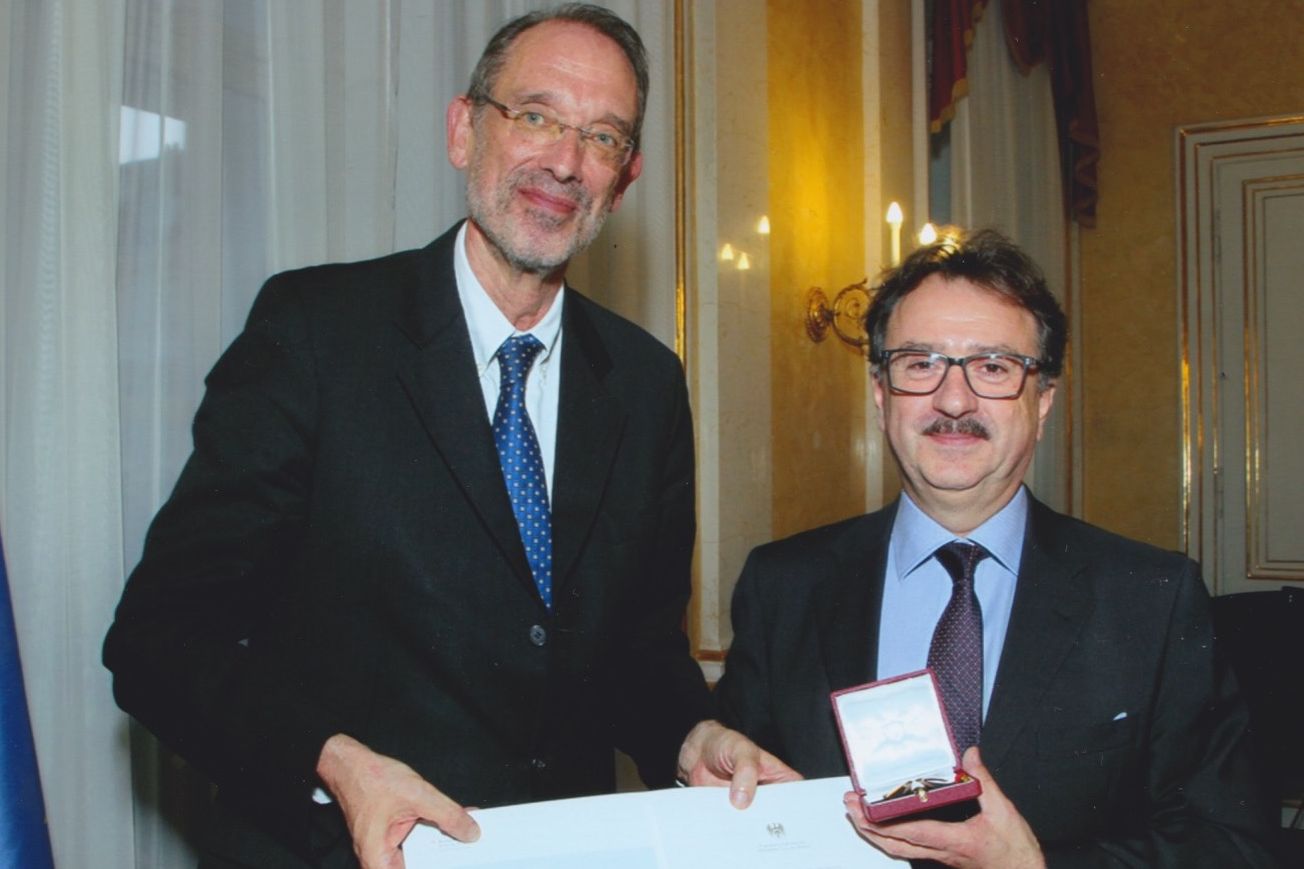
(Vienna, 07 November 2018) Hannes Stockinger, Head of the Center for Pathophysiology, Infectiology and Immunology and also Head of one of the Center’s subunits (Institute for Hygiene and Applied Immunology) at the Medical University of Vienna, has been awarded the Austrian Cross of Honour for Science and Art, 1st Class.
Austrian Cross of Honour or Cross of Honour for Science and Art is awarded by the Austrian President on the recommendation of the Federal Government or a government-authorised Federal Minister.
Hannes Stockinger is Professor of Molecular Immunology and Head of the Center for Pathophysiology, Infectiology and Immunology and Head of the Institute for Hygiene and Applied Immunology, one of the Center’s subunits at the Medical University of Vienna. With 300 employees, the Center is one of the largest translational preclinical research institutes of the Medical University of Vienna. Stockinger was also co-founder and CEO of the biotech SME BMT [Centre of Excellence for Biomolecular Therapeutics].
Discoverer of the "lipid raft"
Hannes Stockinger and his research team were the first to discover and characterise a series of critical receptors/ligands on the cell membrane of immune cells and to discover how immune cells use these to communicate with each other to protect our bodies. Together with Vaclav Horejsi (Czech Academy of Sciences, Prague), he also discovered how a group of receptors, the so-called GPI proteins, which are anchored in the outer plasma membrane layer by glycolytic glycosylphosphatidylinositol (GPI), transmit signals via the plasma membrane: namely via cell membrane structures that are now referred to as lipid rafts and are regarded as the central switching points for the transmission of information from the cell environment into the cell interior via the cell membrane.
Pioneer of monoclonal antibodies
The tools used for structural and functional characterisation of these receptors were and still are monoclonal antibodies (mAb). Stockinger learned how to produce them in a pioneering project when he was a doctoral student in Walter Knapp’s laboratory in the 1980s. These mAb are still used for research into the immune system and for diagnosing autoimmune diseases and leukaemia. His team at the time was the first to use mAb therapeutically, thereby laying the foundation for the immunotherapies that are now used so successfully in the treatment of cancer and autoimmune reactions as well as in organ transplantation. On the strength of these achievements, Hannes Stockinger has been a member of the international Human Cell Differentiation Molecules Council for 15 years. This is the body that allocates the CD nomenclature for diagnostic and therapeutic antibodies.
Working closely with biophysicist Gerhard Schütz (Technical University of Vienna), Stockinger also built high-resolution microscopes. For the first time, these nanoscopes enabled them to resolve individual molecules (especially membrane receptors) in living (immune) cells and study them. These studies provide a completely new insight into the organisation and workings of the molecules in cells, thereby providing a basis for developing new diagnostic and therapeutic strategies. These research papers have been published in more than 20 publications, including some of the top-ranking journals from Nature Publishing Group.
Alongside the analysis of biochemical processes on a nanoscopic level, Stockinger is also interested in researching the targeted and safe delivery of drugs by new types of liposomes. Based on impressive in-vitro and mouse studies, these liposomes are already being manufactured for a Phase-1 clinical trial for treating rheumatoid arthritis (funded by an EU project). A third current research interest is the development of improved diagnostic techniques for bacterial diseases, especially Lyme's disease (also funded by the EU).
Hannes Stockinger's research work is documented in 200 scientific papers (some of which have appeared in top-ranking journals such as Cell, Science, Nature Methods, Nature Immunology, The Journal of Experimental Medicine and Science Signaling).
Involvement in professional societies and education
Hannes Stockinger has carried out numerous functions in national and international research associations and organisations. For example, he was President of the Austrian Society for Allergology and Immunology, a member of the Board of Trustees of the Austrian Science Fund, treasurer of the European Federation of Immunological Societies, and much more. He is currently President of the Federation of Austrian Scientific Societies, which has 160 member societies and approximately 30,000 individual members.
One of his major interests is the promotion and education of young scientists.
As the first Curriculum Director (2003-2010) and Chairman of the Curriculum Committee for Doctoral Studies (2010 to the present day), he has built up the Medical University of Vienna’s PhD capability by creating one of the most successful PhD schools, which currently supervises 1,400 PhD students. He founded the Young Scientist Association (YSA) and the PhD Symposium at our university and has personally guided 36 students through their PhDs. He has also supervised countless undergraduate and postgraduate students.
Many of his PhD students came from Eastern European countries. This taught him a lot about the problems of scientists in these countries, inspiring him to help them in their efforts to achieve Western standards. Examples of this are: since 2000 he has worked with Vaclav Horejsi to organise the renowned biennial Tatra Immunology Conference in Slovakia. In 2009, he founded the South Eastern European Immunology School, which has now been held 10 times (in all the Balkan states, in Romania and Ukraine right through to Armenia). He has received multiple distinctions for his work in South Eastern Europe: these include Guest Professor of the University of Kragujevac, Serbia, Honorary Member of the Georgian Society of Allergology and Clinical Immunology, Honorary Award from Danylo Halytsky Lviv National Medical University, Ukraine, Honorary Medal from Danylo Halytsky Lviv National Medical University, Ukraine and Adjunct Professor of Immunology at Jerewan State Medical University, Armenia.
Link: Center for Pathophysiology, Infectiology and Immunology: https://www.meduniwien.ac.at/hp/CePII